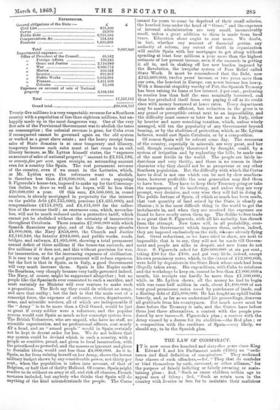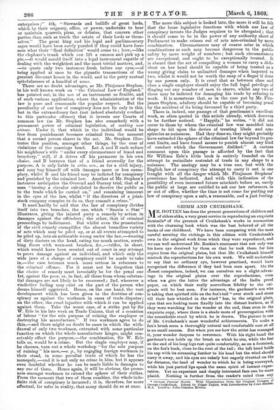THE LAW OF CONSPIRACY.
IT is now some five hundred and sixty-five years since King Edward I. and his Parliament made (1304) an "ordinance and final definition of conspirators." They reckoned four classes of such offenders,-1st, "They that do confeder or bind themselves by oath, covenant, or other alliance," for the purpose of falsely indicting or falsely swearing or maintaining pleas ; 2nd, " Such as cause children within age to appeal men of felony ; 3rd, " Such as retain men in the country with liveries or fees for to maintain their malicious
enterprises ;" 4th, " Stewards and bailiffs of great lords, which by their seignory, office, or power, undertake to bear or maintain quarrels, pleas, or debates, that concern other parties than such as touch the estate of their lords or themselves." The great king and his legal and parliamentary sages would have been sorely puzzled if they could have foreseen what their "final definition" would come to ; how,—like the elephant's trunk which can lift a cannon and pick up a pin,—it would mould itself into a legal instrument capable of dealing with the weightiest and the most trivial matters, and, —to quote only two instances fresh before our eyes,—of being applied at once to the gigantic transactions of the greatest discount house in the world, and to the petty mutual spitefulnesses of a handful of nuns.
There are no doubt advantages, as Mr. Fitzjames Stephen, in his well known work on " the Criminal Law of England," has pointed out, in the use of an instrument so flexible, and of such various application, where the administration of the law is pure and commands the popular respect. But the peculiarity of our law of conspiracy does not lie only in this, but in the extraordinary fact (not indeed absolutely confined to this particular offence) that it invests our Courts of common law (as Mr. Stephen has also remarked) with a permanent power of criminal legislation, of making new crimes. Under it, that which in the individual would be free from punishment becomes criminal from the moment that • a second person shares in the act. Mr. Stephen illustrates this position, amongst other things, by the case of violations of the marriage bond. Let A and B each seduce his neighbour's wife "under every circumstance of fraud and treachery," still, if A drives off his paramour in his own chaise, and B borrows that of a friend avowedly for the purpose, A is only liable in crim. con., as for a civil injury, and may buy himself off with damages more or less exemplary, whilst B and his friend may be indicted for conspiracy and punished by the criminal law. Another of Mr. Stephen's instances anticipates the Overend and Gurney trial, that of a man "issuing a circular calculated to deceive the public as to the trade which he carried on," and remaining innocent in the eyes of the law, whilst " if the directors of a jointstock company conspire to do so, they commit a crime."
It need hardly be said that the law of conspiracy divides itself into two branches, the one, which " Saurin v. Star " illustrates, giving the injured party a remedy by action in damages against the offenders ; the other, that of criminal proceedings by indictment. But whilst even the prosecution of the civil remedy exemplifies the almost boundless variety of acts which may be piled up, or at all events attempted to be piled up, into an actionable wrong under the law,—wearing of dirty dusters on the head, eating too much mutton, scrubbing floors with worn-out brushes, &c.,—trifles, in short, which would have been scouted out of court in any attempt to prove damage against an individual, and which only the wide jaws of a charge of conspiracy could be made to take in,—the case becomes much more serious in reference to the criminal offence. For it must not be forgotten that the choice of remedy must invariably be for the penal one 1st, against the poor, or, in fact, all those from whom substantial damages are not likely to be recovered ; 2nd, wherever a vindictive feeling may exist on the part of the person who deems himself aggrieved. Hence, on the one hand, the vast development which has been given to the doctrine of conspiracy as against the workmen in cases of trade disputes ; on the other, the cruel injustice with which it can be applied against them. Take the worst case, of a strike put by Sir W. Erle in his late work on Trade Unions, that of a cessation of labour " for the sole purpose of ruining the employer or destroying his manufacture." If two workmen agree to do this,—and there might no doubt be cases in which the withdrawal of only two workmen, entrusted with some particular function on which the whole manufacture hinges, might conceivably effect the purpose,—the combination, Sir W. Erle tells us, would be a crime. But the single employer may, if he chooses, turn out a whole workshop "for the sole purpose of ruining " his men,—e. g., by engaging foreign workmen in their stead, in some peculiar trade of which he has the monopoly,—and it is not only no crime in him, but it appears even doubtful whether he can be made liable in damages to any one of them. Hence again, it will be obvious, the proneness amongst workmen to extend the sphere of their strikes. From the moment that two of them combine, the whole indefinite risk of conspiracy is incurred ; it is, therefore, far more effectual, far safer in reality, that many should do so at once. The more this subject is looked into, the more it will be felt that the loose legislative functions with which our law of conspiracy invests the Judges requires to be abrogated ; that it should cease to be in the power of any authority short of Parliament to make crimes out of acts non-criminal by mere combination. Circumstances may of course arise in which combinations as such may become dangerous to the public safety by mere weight of numbers ; but such circumstances are exceptional, and ought to be exceptionally treated. It is absurd that the act of compelling a woman to carry a dishclout on her head should be capable of being treated as a wrong giving claim to unlimited damages when imputed to two, whilst it would not be worth the snap of a finger if done by one person only. It is cruel that as between class and class a single employer should enjoy the full legal privilege of flinging out any number of men to starve, whilst any two of these may be indicted for damaging his trade by refusing to work. It is monstrous that, as in the case put by Mr. Fitzjames Stephen, adultery should be capable of becoming penal by the accident of its being favoured by a third party. There is, indeed, one passage of that gentleman's excellent work, so often quoted in this article already, which deserves to be further noticed. " Happily," he writes, " it did not occur to those by whom the criminal law was moulded into shape to hit upon the device of treating libels and conspiracies as nuisances. Had they done so, they might probably have extended the sphere of the criminal law far beyond its present limits, and have found means to punish almost any kind of conduct which the Government disliked." A curious comment upon this passage is afforded by the fact that Sir William Erle's little book is entirely founded on the attempt to assimilate restraint of trade in any shape to a nuisance. The analogy may be a true one, but with the English law of conspiracy the attempt to carry it out is one fraught with all the danger which Mr. Fitzjames Stephens' prescience has indicated. And with this indication of the possibility of even increased future mischiefs before us, surely the public at large are entitled to ask our law reformers, in or out of office, whether the time is not come for putting our law of conspiracy upon a safe, a reasonable, and a just footing.



































 Previous page
Previous page